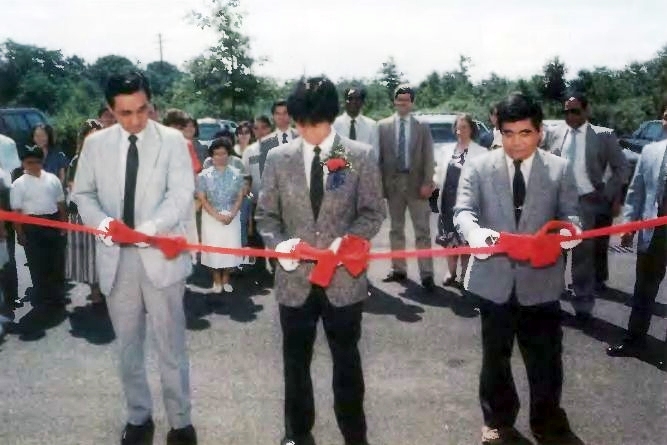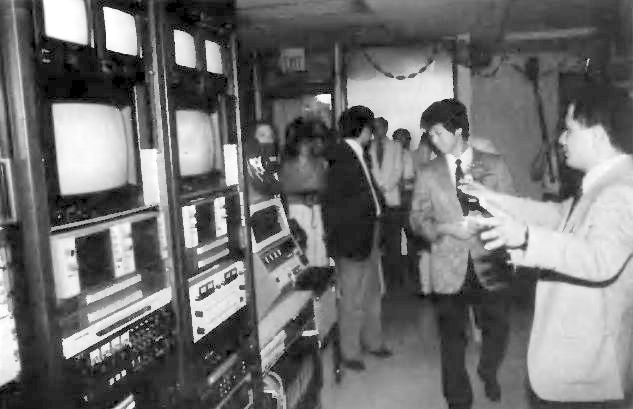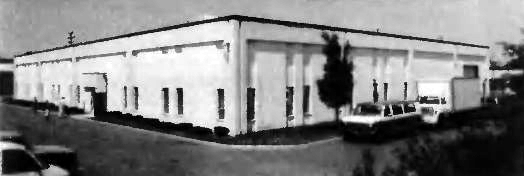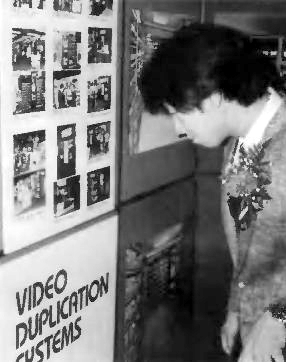![]()
The Words of Hyo Jin Moon
|
|
The Words of Hyo Jin Moon |

The
Future Productions staff members show Hyo Jin Nim around the factory
It was a hot, muggy Saturday, July 30, 1988, when Hyo Jin Nim inaugurated Future Productions' new video duplication facility in Fair Lawn, New Jersey. But with him he brought the refreshing spirit of True Parents and Father's vision of the direction our movement should take in the field of film and video. We were deeply grateful that he came and invested his enthusiasm in the new start we were making.
Hyo Jin Nim was especially inspired that Future Productions had taken the initiative to develop the seed that True Parents had planted. "This is the right kind of tradition," he said at the grand opening. "Father started this specific mission, but you, centering upon Mr. Matsuda and his staff members, took this mission upon yourselves. Through your responsibility, through your efforts, independently, you have reached a substantial standard."
Future Productions moved out of its original facilities in the World Mission Center to the 12,000 square-foot plant in New Jersey after nearly two years of searching for the proper site. The new location will provide much- needed room for expansion. "We looked at more than 100 places," said Ken Washino, vice president and technical manager, in a speech at the opening. "We feel that Heavenly Father guided us to the ideal place for us."
Hyo Jin Nim, along with Mr. Shunichiro Yoshida, representing Rev. Kwak, and Mr. Norio Matsuda, the director of New Future Films, cut the ribbon to mark the official opening of the new factory. The more than 100 guests were led on a tour through the duplication lab, the hardware manufacturing rooms, and the warehouse. Children's educational tapes were being duplicated in one area, while in the warehouse, the staff was packaging and shrink-wrapping the duplicated tapes.

Mr.
Yoshida, Hyo Jin Nim, and Mr. Matsuda cut the ribbon to open Future
Productions' new video facility
Hyo Jin Nim congratulated the members for the big step they had taken. This is just the beginning, he reminded us. At this point our video duplication facility is only reproducing the programs created by others. Now we should also begin to create our own programs.
"If you really believe that video is the way to send Father's message out to the world, then you have to think about production, not just reproduction," he said. "What you need now is content, internal quality... I am sure you have a production company in mind for the future. That is the next step... I really believe that through this audio / visual medium we can touch many people substantially. It creates a very direct response."
Satan has already created a substantial foundation in this world, he said, but we must insure that the next chapter of history is written by Heavenly Father. "Heavenly Father will win," he said forcefully. "There is no doubt about it. Heavenly Father has to fulfill His purpose of creation. We have to share that burden."
The grand opening was a good time to explain the relationship between New Future Films and Future Productions. New Future Films was begun by True Parents in 1975 as a church department, with only four members. Centering on Mr. Norio Matsuda, a 777 Couple, its purpose was to record Unification Church events on film and video, especially the history of our True Parents. Future Productions, on the other hand, was founded in 1977 as a video-oriented business corporation to raise funds to support the church, centering on Mr. Matsuda's wife Mitsuko, as president. For seven years, Future Productions stayed in this quiet stage of development.
Then in 1984, Father asked that 300,000 sets of videotapes (a total of almost a million tapes) be distributed to ministers throughout America. New Future Film's small film crew was turned upside down. A thousand video cassette recorders (VCRs) were purchased, and Divine Principle tapes in English, French, Japanese, and Spanish began to be turned out. Thus the Unification Church dove into video when much of the world was still unaware of its significance.
While getting the tapes out to the ministers had dispensational significance, also the physical fact of duplicating nearly a million tapes had dispensational significance, and presented many obstacles. If the tapes could not be reproduced within the time period given, they could not be distributed. It was a tremendous responsibility. The problems involved in learning to control 1,000 VCRs in such a short time, with members who had virtually no experience in either video or electronics, seemed almost insurmountable.
By trial and error, the members created a makeshift duplicating system that could route the signal from the source to all the VCRs, turn on all or part of the VCRs simultaneously, and put them into record or rewind. Members worked literally around the clock for almost six months duplicating the tapes. Somehow a million tapes were delivered to all the church centers and distributed.

The
new 12,000- square-foot plant in New Jersey
It was then suggested that Future Productions use the foundation that was established to support the American movement financially. The fruits of their three years of effort since then could be clearly seen at the grand opening of the New Jersey plant.
While many elements have contributed to Future Production's reaching its present level, among the most important, said Mr. Washino, was the internal foundation that was laid. "We have tried to unite strongly," he said, "and to have faith that we could break through any difficulty. Our staff has worked extremely hard. They were willing to work hard at any task."
While competing in the business world, they tried to keep their vision focused on the ideal, he added. "In the outside world, business means competition and trying to defeat one another. But what we have done was not just to compete, but to help others and to try and develop the market together. This is Father's tradition: give and take. We feel this is our responsibility, to restore the business world."
Future Productions is now one of the largest video duplicators on the East Coast, but Hyo Jin Nim reminded them that Father would certainly like to see them be the largest in America -- and develop and produce their own programs. "You can conjure up boundless things," he said. "You are boundless, your mind is boundless... That is the quality of the Creator. You can do anything you want, anything you set out to do."
In February 1985, Future Productions was one of the largest, if not the largest, video duplication facilities on the East Coast. Most duplication facilities had between 20 to 50 video cassette recorders. Future Productions had a thousand -- a huge duplication capacity, but none of the related services that are normally a part of every company. They had no packaging capability, no sales force, and no marketing strategy.
But Father had a vision for video that few people at the time were able to grasp. "When Father started the Divine Principle video project," said Mr. Ken Washino in his speech at the opening of their new facility, "no one before had attempted such a large distribution of tapes. No one else had created such a large video duplication system."
When the Unification Church began its "video providence," a VCR cost around $1,000 to $1,200 and thus could be afforded by only a very few. How could anyone have imagined that within a few years VCRs would cost only slightly over $200 each and be owned by almost every household?

Hyo
Jin Nim visits The Future Productions factory
Father must have seen the future clearly, for he quickly understood the importance of video for God's providence. While a TV or radio show can only be broadcast one time, a videotape can be played over and over. Through this medium, it would be possible for people to view the Divine Principle lectures again and again.
However, the team wasn't able to anticipate the direction of the later booming home video market, said Mr. Washino. "If we had realized this market trend then," he said, and if we had had enough marketing experience, we could have made a much larger business foundation quickly."
With no sales team, no marketing experience, and none of the basic services that were demanded by the market, how were they to keep 1,000 VCRs busy? They gradually began to develop a foundation in production, sales, marketing, management, and customer service. They began an advertising campaign and started to promote their company at trade shows.
The spearhead of that growth was the in-house development of an improved video duplication system. One of the staff had used his experience in electrical engineering to sort out the bugs in their existing duplication system. (That also included the bugs in an expensive set-up purchased from the industry's major video duplication system designer.)
While trying to improve the Future Productions system, he developed a unique new system that offered major improvements over what was on the market, at only a fraction of the cost. The staff began marketing it at prestigious trade shows, such as the National Association of Broadcasters and the Society of Motion Picture and Television Engineers. In the last two years alone, they have set up over 200 systems, involving 5,000 VCRs. They have set up systems in both North and South America and soon will be setting up one in China.
On this foundation, the company gained a reputation for not only technical expertise but good customer relations.
Video is a young industry. When video began to take off, there were many companies that sprang up overnight to take advantage of the video boom; they made a few million dollars for their owners before folding or going into bankruptcy. In such a milieu, Future Productions stood out.
One of their suppliers told them, "You are the only company in the video industry that pays when you promise."
"We started out as a servant of servants," says Timothy Forster, marketing manager. "We started in a very 'tooth and nail' part of the market, where people cheat and are dishonest. We tried to go to their level and embrace them, but with the right heart... That's where we tested our attitude. We thought, are we going to become like them, or keep our own tradition?"
"Everyone watched us very carefully," recalls Mr. Washino, "because they knew we were Moonies."
But once they had established relationships of trust with their customers, they found that their customers began testifying about them to other companies. "When that began happening,"
Mr. Forster says, "We knew we had established a certain kind of internal victory. Instead of compromising our philosophy or religion, we tried to inspire them that it's better to be sincere, honest, and responsible. It was basically the principle of home church. You make relationships that are long-term. You don't just make a quick dollar and get out of the industry tomorrow."
When they went from just doing duplication to marketing the duplication system hardware, many people warned them that it would never work.
"People would ask us, 'Why are you setting up systems that will upgrade and organize your own video duplication competitors?"' says Mr. Forster. "'You're cutting your own throats.' But we told them, 'No, there's business out there for everyone. We're here to serve.' And in fact our business has been doubling every year."
"We have really given our best effort to gain a reputation with customers by going Father's traditional way," says Mr. Washino. "And we have experienced that when we try our best, even when we have no experience and little confidence, we can accomplish."